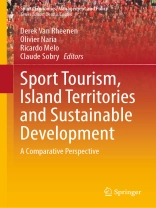This edited volume discusses the role of sport tourism in local sustainable development in small island territories. Using an international, comparative study, this volume explores the contributions of sport tourism to sustainable development in island settings. Written by 25 research teams across ten seas, oceans, and island archipelagos, chapters present comparative findings with the view of assisting stakeholders and decision-makers in collaboratively and responsibly developing island territories in accordance with specific sustainable development goals. Presenting a refined comparative methodology at the intersection of sport tourism and sustainable development, this book is geared towards academic researchers and students interested in sport tourism, sports economics, management and sustainable development, as well as professionals.
विषयसूची
Foreword.- Introduction.- Part I. Conceptual and Methodological Frameworks: A Comparison of Place from an Eco-territorial Perspective.- Chapter 1. Small Island States or Territories.- Chapter 2. The Geography of Island Spaces: Adventure Grounds for Sport Tourism.- Chapter 3. Sport Tourism, island territories and sustainable development: A literature review on the contribution of sport tourism to the sustainable development goals in island settings.- Chapter 4. Conceiving of Islands as Ecoterritories.- Chapter 5. A Comparative Methodology Re(de)fined: Place or Space.- Part II. From Islands to Archipelagos: Sport Tourism in a Globalized World.- The Mediterranean Sea (inclusive of the Tyrrhenian Sea).- Chapter 6. Sport Tourism in Malta: Getting Off the Beach.- Chapter 7.The Emerging Sport Tourism Destination of Sardinia.- Chapter 8. Kalymnos as a Sustainable Destination.- The North (Baltic) Sea.- Chapter 9. A Case Study of Helgoland and Rügen Island.- The Atlantic Ocean.- Chapter 10. Azores: Sport tourism Development towards Sustainability.- Chapter 11. Sport Tourism in the Canary Islands: The Diversification of Mass Tourism.- Chapter 12. Madeira archipelago: Paths to a sustainable nature sport tourism destination.- The Caribbean Sea.- Chapter 13. Barbados Islands.- The Pacific Ocean.- Chapter 14. Sport Tourism in French Polynesia.- Chapter 15. Sport Tourism in Tahiti.- Chapter 16: Sport Tourism and Local Sustainable Development in Small Island Territories: The Case of Kiribati.- Chapter 17. Triathlon Race in Irago on the tip of the Atsumi Peninsula in Japan.- Chapter 18. Sport Tourism, Sporty Leisure and Sustainable Development in Singapore.- The Indian Ocean.- Chapter 19. How Sport Tourism Helps Small Islands Destinations to Improve their Resilience: The Case Study of La Reunion Island.- Chapter 20. Mauritius as a Sustainable Island Destination: Opportunities, Implications and Challenges for Sport Tourism.- Chapter 21. Towards the Development of a Sustainable Sport Tourism Destination in Madagascar: The Key Role of Inhabitants.- Chapter 22. Developing Nature Sports and Hiking in Mayotte: An Island in a Triple Insularity Situation.- Chapter 23. Sport Tourism and Local Sustainable Development in Rodrigues.- Chapter 24. Sport Tourism: An Undeniable Asset for Sustainable and Local Development in Comoros. Chapter 21. Sport in Maldivian Islands. Between Tourism, Land Policies and Power Relationships.- Chapter 25. The Role of Sport Tourism in Diversifying Tourism Activities in Zanzibar: The Need for Institutional Arrangement.- Part III. Comparative Analyses of Islands and Island Archipelagos.- Regional Analysis.- Chapter 27. Sport tourism, a factor of sustainable development in island territories: dynamics, actors and stakes in the Indian Ocean.- Global Analysis.- Chapter 28. A Comparative Study of Small Islands, Sport Tourism and Sustainable Development: A Local to Global Perspective.- Future Directions.- Chapter 29. Small Island Developing States (SIDS) Leadership in Sport Tourism.-Epilogue.-Chapter 30. The End of a Journey: Reflections and New Beginnings.
लेखक के बारे में
Claude Sobry is an economist by training. He is now Professor Eméritus at the University of Lille where he taught at the Faculty of Economics and the Faculty of Sports Sciences. He first became interested in the economy of sport and then in sports tourism. He founded the International Research Network In Sport Tourism in 2010, a network of academics from all countries and disciplines. He has lectured and participated to conferences in many countries and published numerous articles, chapters and books.












